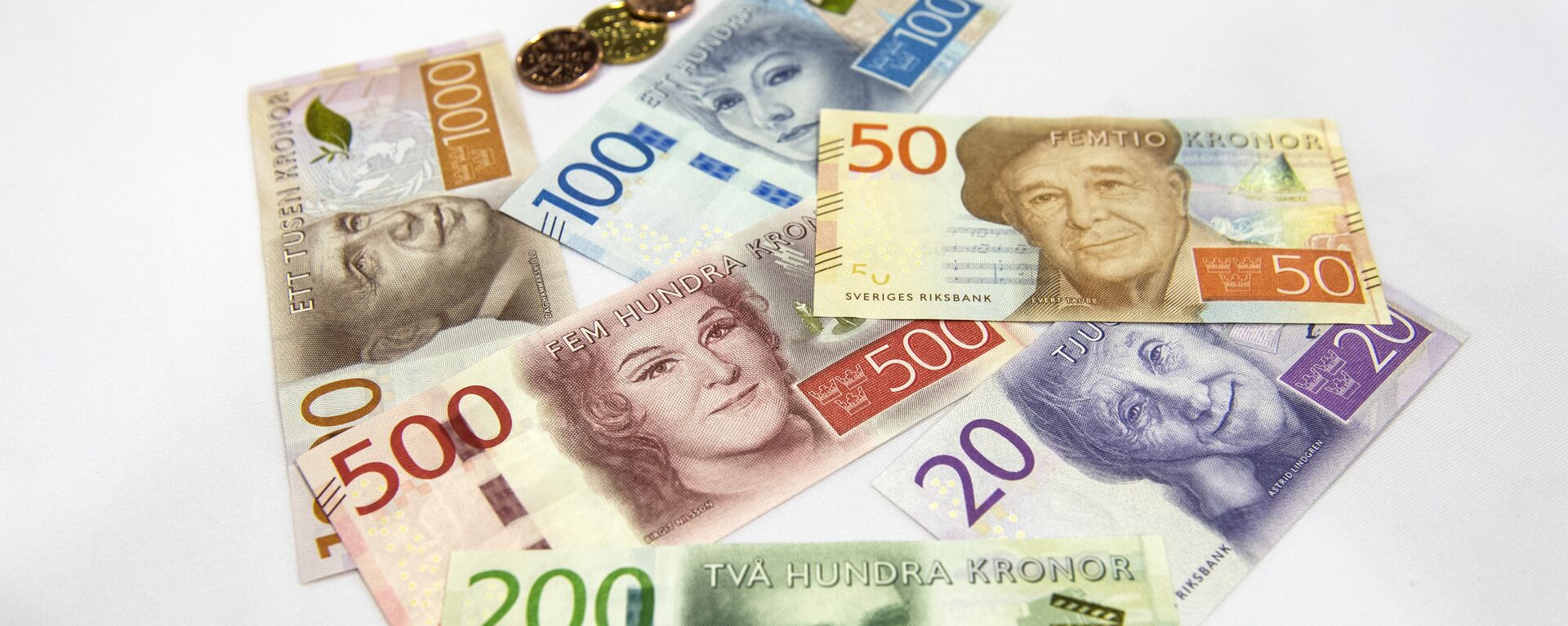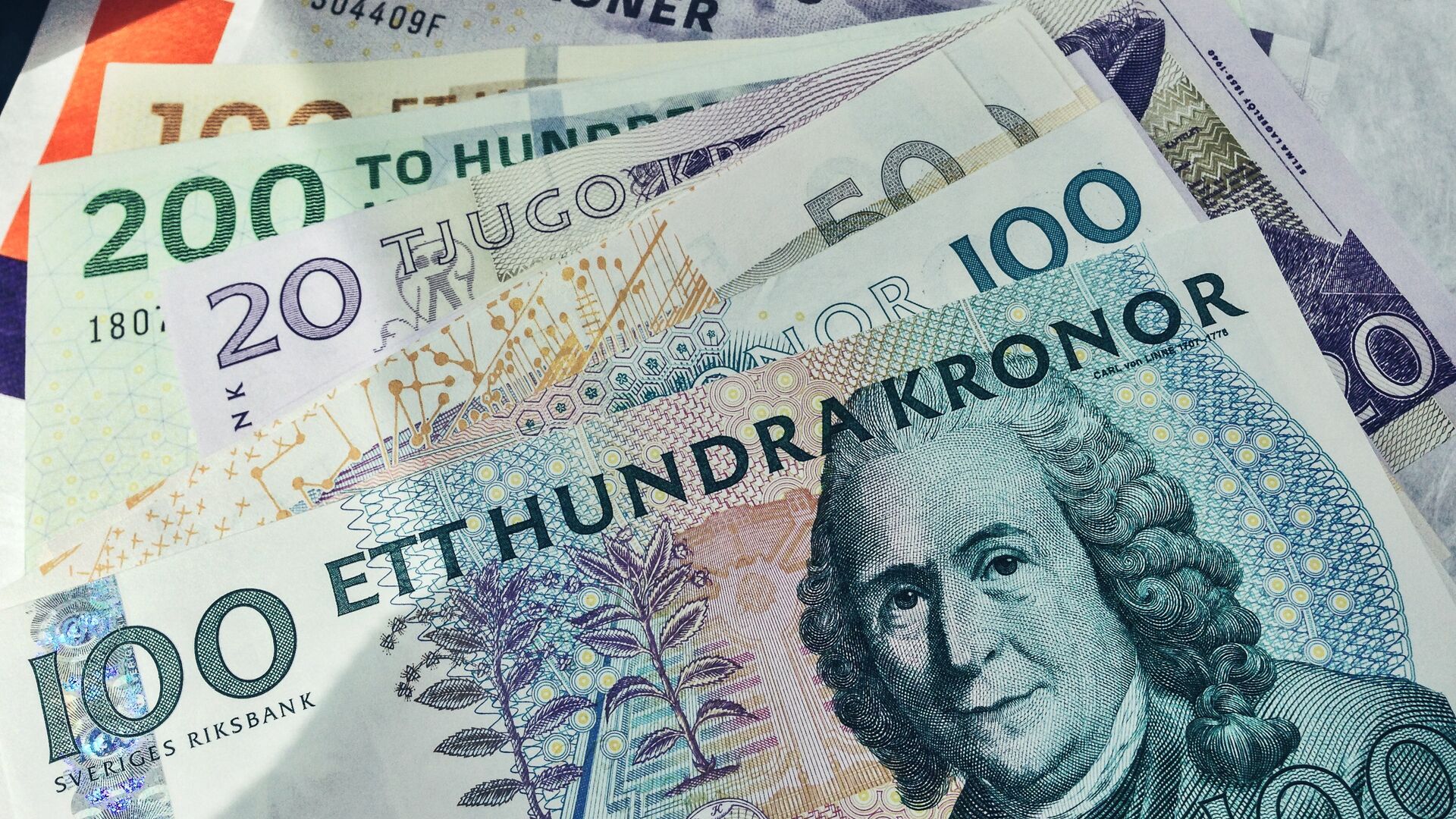https://sputnikglobe.com/20230214/swedens-economy-is-eus-worst-performer-blocs-own-forecast-proclaims-1107393076.html
Sweden's Economy Is EU's Worst Performer, Bloc's Own Forecast Proclaims
Sweden's Economy Is EU's Worst Performer, Bloc's Own Forecast Proclaims
Sputnik International
The economic decline has been pinned on massive inflation, rising housing costs, exorbitant level of indebtedness and variable interest rates on loans and mortgages.
2023-02-14T08:37+0000
2023-02-14T08:37+0000
2023-02-14T08:37+0000
economy
sweden
scandinavia
news
economy
financial crisis
debt
https://cdn1.img.sputnikglobe.com/img/107289/92/1072899229_0:28:3145:1797_1920x0_80_0_0_5d388f90d044f4b82317f9bbc7880b2f.jpg
Sweden's economy is the worst performer of all the EU's 27 member states, according to the European Commission's latest forecast. Its GDP is even expected to shrink this year by 0.8 percent, making Sweden likely to become the EU's only member state with negative growth.The decline has been linked to the fact that families are being forced to acclimatize to thinner wallets because of inflation and rising housing costs. The annual inflation rate in Sweden surged to 12.3 percent in December 2022, its highest level since February 1991, accelerating from 11.5 percent in November. The Swedes' exorbitant level of indebtedness, which recently passed the symbolic threshold of SEK 100Bln ($9.6Bln), and the tradition of having variable interest rates on mortgages, mean that their purchasing power has fallen faster and more drastically than in many fellow EU states.The European Commission also expects unemployment to rise because of the deteriorating economy. Above all, the construction sector will suffer from rising costs and reduced demand as housing costs increase. Swedish companies are also expected to become more cautious with investments because of the general uncertainty and changes in interest rates.According to Annika Alexius, a professor of economics at Stockholm University, household pessimism is made worse by the high level of loans.She also argued that even if the majority of the households stay afloat, they will have to reduce their consumption quite a lot because of the rocketing interest rates on loans. Overall, she envisaged a "mild recession" not only in Sweden, but around the world.Conversely, Marcus Svedberg, chief economist at one of Sweden's leading insurance companies Folksam, argued that a period of doldrums is inevitable since the rapid growth of recent years has created a certain "drop height".In the forecast for 2024, Sweden's economy is set to return to growth once again (by 1.2 percent). Nevertheless, Sweden is still expected to have the lowest growth in the entire EU - even in 2024.The country predicted to have the highest growth in 2023 is Ireland, whose gross domestic product is expected to grow by 4.9 percent. Malta and Romania are forecast to be the next highest with 3.5 percent and 2.5 percent respectively, the European Commission said.
https://sputnikglobe.com/20230103/sweden-swept-by-major-bankruptcy-wave-as-inflation-energy-crisis-bite-1106000914.html
sweden
scandinavia
Sputnik International
feedback@sputniknews.com
+74956456601
MIA „Rosiya Segodnya“
2023
News
en_EN
Sputnik International
feedback@sputniknews.com
+74956456601
MIA „Rosiya Segodnya“
Sputnik International
feedback@sputniknews.com
+74956456601
MIA „Rosiya Segodnya“
sweden's economy, negative growth, worst in the entire eu, exorbitant indebtedness, deteriorating economy
sweden's economy, negative growth, worst in the entire eu, exorbitant indebtedness, deteriorating economy
Sweden's Economy Is EU's Worst Performer, Bloc's Own Forecast Proclaims
The country's economic decline has been blamed on massive inflation, rising housing costs, Swedes' exorbitant level of indebtedness and the tradition of having variable interest rates on loans and mortgages, which under present circumstances stifles purchasing power faster and more drastically than in fellow EU states.
Sweden's economy is the worst performer of all the EU's 27 member states, according to the European Commission's latest forecast. Its GDP is even expected to shrink this year by 0.8 percent, making Sweden likely to become the EU's only member state with negative growth.
"Households will adjust their consumption expenditure further in response to the loss of real disposable income, the high level of uncertainty and increasing unemployment," the Commission said about Sweden, placing the once-booming economy in the bottom tier.
The decline has been linked to the fact that families are being forced to acclimatize to thinner wallets because of inflation and rising housing costs. The annual inflation rate in Sweden surged to 12.3 percent in December 2022, its highest level since February 1991, accelerating from 11.5 percent in November.
The Swedes'
exorbitant level of indebtedness, which recently passed the symbolic threshold of SEK 100Bln ($9.6Bln), and the tradition of having variable interest rates on mortgages, mean that their purchasing power has fallen faster and more drastically than in many fellow EU states.
The European Commission also expects unemployment to rise because of the deteriorating economy. Above all, the construction sector will suffer from rising costs and reduced demand
as housing costs increase. Swedish companies are also expected to become more cautious with investments because of the general uncertainty and changes in interest rates.
According to Annika Alexius, a professor of economics at Stockholm University, household pessimism is made worse by the high level of loans.
"Banks have had the loans as their cash cow and they were willing give them even if household finances have not been sufficient," she told Swedish media.
She also argued that even if the majority of the households stay afloat, they will have to reduce their consumption quite a lot because of the rocketing interest rates on loans. Overall, she envisaged a "mild recession" not only in Sweden, but around the world.

3 January 2023, 05:14 GMT
Conversely, Marcus Svedberg, chief economist at one of Sweden's leading insurance companies Folksam, argued that a period of doldrums is inevitable since the rapid growth of recent years has created a certain "drop height".
"Sweden's economy is in significantly better shape than most EU countries, with a more balanced budget and relatively low national debt. We also come from higher growth levels with 2.4 percent on average per year since 2010 compared with 1.3 percent within the eurozone," Svedborg told Swedish media.
In the forecast for 2024, Sweden's economy is set to return to growth once again (by 1.2 percent). Nevertheless, Sweden is still expected to have the lowest growth in the entire EU - even in 2024.
The country predicted to have the highest growth in 2023 is Ireland, whose gross domestic product is expected to grow by 4.9 percent. Malta and Romania are forecast to be the next highest with 3.5 percent and 2.5 percent respectively, the European Commission said.





